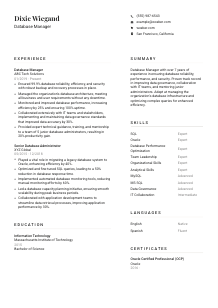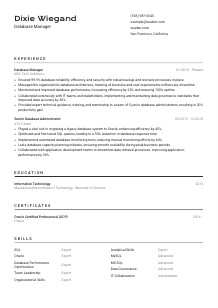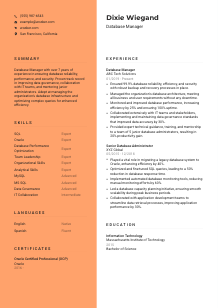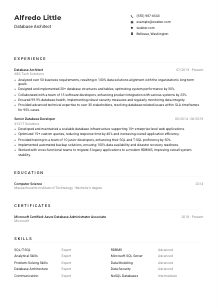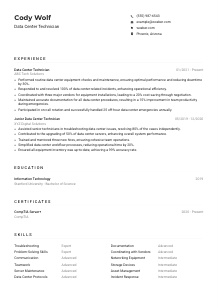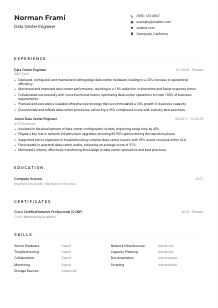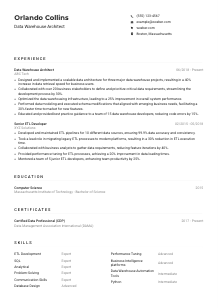Database Manager Resume Example
Orchestrating data, but your resume feels unindexed? Delve into this Database Manager resume example, structured using Wozber free resume builder. Grasp how to organize your database expertise to match job schemas, ensuring your career queries yield the perfect result set!
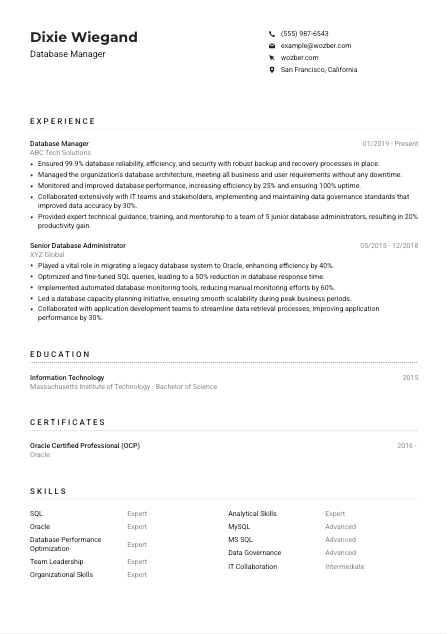
How to write a Database Manager resume?
Hello, aspiring Database Manager! Navigating the intricate world of database management is no small feat, and your resume is your passport to showcasing your prowess in this dynamic field. By harnessing the power of Wozber, a free resume builder, you're about to embark on a journey to tailor a resume that's not just a document, but a beacon of your professional mastery, attuned to the very specifics of your dream job.
Ready to transform your career narrative into a captivating story that secures your spot as a Database Manager? Let's get started!
Personal Details
Your Personal Details section might seem straightforward, but it's the cornerstone of your professional introduction. Let's ensure it's compelling, professional, and harmonizes with the job's Geography.
1. Your Name
Your name launches your personal brand. It's the headline of your career story. Ensure it's in a clear, bold font that speaks professionalism and confidence.
2. Job Title Alignment
Including the job title 'Database Manager' directly below your name acts like a magnet for recruiters' eyes, aligning you with their search from the get-go.
3. Essential Contact Details
Provide your phone number and a professional email (ideally a variation of firstname.lastname@email.com). These are your digital handshakes; make them count.
4. The Geography Match
Mentioning 'San Francisco, California' ensures you're immediately ticking a box in the locality preference of the job description. Show you're where the action is.
5. Professional Profiles
Including a LinkedIn profile link or personal website validates your digital presence and offers a deeper dive into your professional journey.
Takeaway
These personal details are your front liners. They introduce, affirm, and set the stage for the rest of your resume, ensuring every element is in perfect harmony with the Database Manager role you're aspirin to.





Experience
The Experience section is where your story shines brightly, showcasing your triumphs in the realm of database management. Let's unfold your experiences in a manner that reflects your suitability for the Database Manager role.
- Ensured 99.9% database reliability, efficiency, and security with robust backup and recovery processes in place.
- Managed the organization's database architecture, meeting all business and user requirements without any downtime.
- Monitored and improved database performance, increasing efficiency by 25% and ensuring 100% uptime.
- Collaborated extensively with IT teams and stakeholders, implementing and maintaining data governance standards that improved data accuracy by 30%.
- Provided expert technical guidance, training, and mentorship to a team of 5 junior database administrators, resulting in 20% productivity gain.
- Played a vital role in migrating a legacy database system to Oracle, enhancing efficiency by 40%.
- Optimized and fine‑tuned SQL queries, leading to a 50% reduction in database response time.
- Implemented automated database monitoring tools, reducing manual monitoring efforts by 60%.
- Led a database capacity planning initiative, ensuring smooth scalability during peak business periods.
- Collaborated with application development teams to streamline data retrieval processes, improving application performance by 30%.
1. Decipher the Job
Dissect each requirement like a complex database query. Understand what the role demands and how your past experiences align. For instance, the job asks for 'database reliability, efficiency, and security' – areas you've excelled in.
2. Structure with Precision
Chronologically list your roles, keeping the focus sharp with company names, your titles, and the period you've weaved your magic there.
3. Targeted Achievements
Your accomplishments should speak the language of database management. Mention your role in ensuring '99.9% database reliability' or how you 'increased database efficiency by 25%', mirroring the job's requirements.
4. Numbers Speak Louder
Quantify your achievements. Whether it's efficiency improvements or downtime reduction, numbers make your impact tangible and audible.
5. Relevance is Key
Steer your narrative towards database management excellence. Every point should be a testament to your skills and achievements relevant to the job you're targeting.
Takeaway
Your experience section is your chance to shine. It's where you prove your worth and illustrate why you're the best fit for the Database Manager role. The attention to detail, the relevance of your accomplishments – it all converges here.
Education
Your education is the bedrock of your expertise. In the Database Manager role, it's essential to present this section as a solid foundation of your technical proficiency.
1. Highlight Key Requirements
Begin by mirroring the exact educational qualifications the job seeks, such as a "Bachelor's degree in Information Technology, Computer Science, or a related field." This straightaway positions you as a qualified candidate.
2. Simple Yet Powerful Structure
Keep this section clear: list your degree, the field of study, the institution, and your graduation year. It's straightforward yet powerful in conveying your qualification lineage.
3. Degree Specificity
The job requirement is specific about the fields of study. If your degree directly aligns with it, like the "Bachelor of Science in Information Technology," make it a highlight. Display it proudly.
4. Courses and Specializations
In cases where specificity boosts your candidacy – for instance, specialized courses in Oracle or SQL – listing these can enhance your educational narrative.
5. Educational Achievements
If you've bagged honors or been part of relevant clubs, subtly include these to suggest a trajectory of excellence and engagement beyond the classroom.
Takeaway
This section is your educational armor, reflecting years of learning and dedication. Let it signal to the employer that you're armed with the knowledge required to excel as a Database Manager.
Certificates
In the evolving digital landscape, certifications are your badges of ongoing learning and expertise. Especially for a Database Manager role, they underscore your specialized skills.
1. Filter Key Certifications
Your certifications should be a mirror to the job requirements. While the role might not explicitly ask for them, showcasing credentials like an "Oracle Certified Professional" immediately elevates your profile.
2. Prioritize and Showcase
Highlight certifications that are directly relevant to the role. Quality shines over quantity. Let the hiring manager see your dedication to mastering your craft.
3. Date Display
Adding dates, especially to the ongoing certifications, adds a layer of authenticity and shows your commitment to staying updated in your field.
4. Continuous Learning
The tech field is fast-paced. Show an appetite for continuous learning by updating your certifications and pursuing new ones that align with your career goals and the needs of the industry.
Takeaway
Your certifications are not just accomplishments; they're your commitment to excellence and continuous growth. Let them shine as indicators of your readiness and enthusiasm for the Database Manager position.
Skills
The Skills section is a concise showcase of your professional toolkit. Craft it to highlight the proficiencies that make you an exemplary Database Manager.
1. Job Description Decoded
Start by extracting explicit and implicit skills from the job description. For a Database Manager position, emphasize proficiencies in SQL, Oracle, and database management systems like MySQL or MS SQL.
2. Targeted Skill Listing
List your skills that shine in database management – both technical proficiencies like "SQL" and soft skills like "team leadership." This tells the hiring manager at a glance that you're equipped with everything needed for the role.
3. Streamlined and Organized
Keep the list focused and well-organized. Prioritizing skills pertinent to the Database Manager position means every skill you list is a direct echo of your fit for the job.
Takeaway
Think of the Skills section as the toolkit you carry into every professional endeavor. By aligning it closely with the job you're targeting, you are essentially promising the hiring manager that you're well-equipped to tackle the challenges of the Database Manager role.
Languages
In an interconnected world, your ability to communicate in multiple languages could be your ticket to global projects and teams. Tailor this section to reflect your linguistic proficiency as an asset.
1. Revisiting Job Requirements
First, note if the job specifically values language skills. For our Database Manager position, "proficiency in English" was highlighted as an asset.
2. Essential Language Highlighting
If a particular language proficiency is emphasized in the job description, position it prominently in your list and label your level of fluency clearly.
3. Additional Language Skills
Even if other languages aren't directly mentioned, showcasing your multilingual skills can hint at your ability to navigate diverse, global teams or markets.
4. Honesty in Proficiency
Be transparent and realistic about your language skills. Misrepresentation could lead to awkward situations or missed opportunities.
5. Understanding the Role's Reach
In roles with a potential for global interaction, such as database management spanning different regions, your language skills suddenly become invaluable in bridging gaps and fostering communication.
Takeaway
Your language skills are more than just line items on a resume; they're your passport to a world of opportunities. Showcase them proudly and consider every language you speak (or are learning) as a key to unlocking new doors in your career.
Summary
Your summary is your chance to intrigue and convince the hiring manager that you're the perfect match for the Database Manager position. Let's make it unforgettable.
1. Synthesizing the Job Essence
Begin with a deep understanding of the job's core requirements and how your professional journey aligns with them. This insight is your foundation.
2. A Strong Opening
Introduce yourself with a statement that encapsulates your professional identity and your paramount achievements, like your '7 years of experience ensuring database reliability and performance.'
3. Mirror Job Requirements
Weave in skills and accomplishments that speak directly to the job's needs, indicating why you're not just a candidate but the candidate.
4. Brevity with Impact
Keep it concise but potent. Your summary should be a teaser that pulls the hiring manager in, making them eager to dive deeper into your resume.
Takeaway
This summary is your billboard. It's what grabs attention and makes the hiring manager want to know more about you. Craft it with care, making sure it reflects your expertise and passion for the Database Manager role.
Embarking on Your Database Manager Journey
As we wrap up, take a moment to appreciate the journey you've embarked on. Crafting a tailored resume with Wozber's free resume builder, using ATS-friendly resume templates, and optimizing with our ATS resume scanner isn't just about landing a job; it's about defining your career path. Remember, each section of your resume is a chapter in your professional story – make them count.
Now, armed with insights and tools, you're ready to construct a resume that not only meets the job requirements but showcases the unique database manager you truly are. Embrace the process, and let your resume be the key that unlocks your next great opportunity.

- Bachelor's degree in Information Technology, Computer Science, or a related field.
- Minimum of 5 years experience in database administration or data management roles.
- Proficiency in SQL and experience with database management systems such as Oracle, MySQL, or MS SQL.
- Strong analytical and organizational skills with an eye for detail.
- Ability to collaborate effectively with cross-functional teams and communicate complex ideas to non-technical stakeholders.
- Proficiency in English is a significant asset.
- Must be located in San Francisco, CA.
- Ensure that databases are reliable, efficient, and secure, with appropriate backup and recovery processes in place.
- Manage the organization's database architecture and infrastructure, ensuring it meets the business and user requirements.
- Monitor database performance and recommend improvements for increased efficiency and reliability.
- Collaborate with IT teams and business stakeholders to implement and maintain data governance and data quality standards.
- Provide technical guidance and mentorship to the database team, ensuring skill development and growth.





